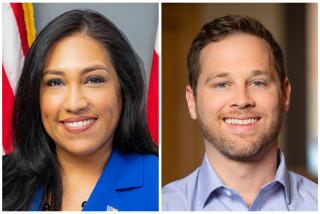Senate Candidates Show Strong Fund-Raising Powers : Campaigning: Prospective hopefuls for two seats in 1992 have raised $11 million among them.
Candidates for California’s two U.S. Senate seats at stake in the 1992 election already have raised more than $11 million and are headed into the primary campaigns with $9 million cash on hand, reports filed Wednesday with the Federal Elections Commission disclosed.
The end of July was the deadline for all candidates and prospective candidates to report contributions and expenditures for the first half of 1991. At this stage of the campaign--15 months before the final vote--fund-raising ability is a key test of a potential candidate’s seriousness and staying power.
What the reports revealed was that nearly all the declared or prospective candidates have demonstrated potent fund-raising ability in spite of the recession, which has discouraged a number of people from giving money to charities, nonprofit enterprises and other political campaigns.
The one major exception was former Gov. Edmund G. (Jerry) Brown Jr., a Democrat who has declared his intention to run for the six-year seat now held by Democratic Sen. Alan Cranston. Brown is attempting to develop a new method of financing his campaign and filed no financial report Wednesday.
Brown has said he wants to be able to run a statewide campaign while refusing to accept any single contribution of more than $100 because he considers the high-stakes political money game to be obscene. Brown also has expressed a tentative interest in the Democratic nomination for the presidency. Federal law limits individual campaign contributions to $1,000 each for the primary and general elections.
“We’re trying to give some real clear signals that this isn’t business as usual,” George Cappanelli, coordinator of Brown’s exploratory committee said. “In the very near future, Jerry Brown will be making some major statements on the whole question of fund raising and government.”
The most prodigious fund-raising was demonstrated by Democratic Rep. Mel Levine of Santa Monica, who collected $1.7 million in campaign contributions during the first six months of this year--about $1 million of it at a Beverly Hills fund-raising dinner May 30. Added to a fat bankroll carried over from his House campaigns, Levine had more than $3 million in cash to finance an expected contest to succeed Cranston, who is retiring. Levine has not formally announced his candidacy.
Levine’s major potential competitors for the Democratic nomination lagged behind him on the money trail, but still registered respectable amounts of cash. Rep. Barbara Boxer of Marin County raised more than $500,000 during the period and brought along nearly $500,000 from her Congressional campaign fund. Lt. Gov. Leo T. McCarthy, who lost a Senate contest to Wilson in 1988, collected more than $800,000.
Among Republicans, Rep. Tom Campbell of Stanford had a bank account of $1.5 million at the end of June for his bid for the Cranston seat. His major opponent so far, conservative Los Angeles television commentator Bruce Herschensohn, raised only $189,000 during the period. But Ken Khachigian, Herschensohn’s campaign manager, said Herschensohn is ahead of the fund-raising pace of his 1986 campaign and “he has strength beyond the raw dollars.”
Also at stake next year will be a two-year interim Senate term created by Gov. Pete Wilson’s resignation after his election as California’s chief executive. Wilson appointed former state Sen. John Seymour of Anaheim to the seat and Seymour is running for the two-year term.
One reason Wilson picked Seymour, a former real estate businessman, was for his fund-raising ability. Seymour had set $1 million as a target for the first half of 1992 and he topped that goal by nearly $200,000. Seymour goes into a primary against conservative Rep. William E. Dannemeyer of Fullerton with more than $750,000 in the bank. Dannemeyer demonstrated that he will be able to run a financially credible campaign by raising more than $800,000 during the period. But $505,000 of that was in the form of a personal loan from Dannemeyer to his campaign committee.
The one declared Democratic candidate for the Seymour Senate seat is former San Francisco Mayor Dianne Feinstein, who lost a narrow contest to Wilson for governor last November. Feinstein received more than $800,000 in contributions and had more than $600,000 on hand at the end of June.
Feinstein’s potential Democratic challenger, state Controller Gray Davis, raised only $436,565 during the period, but he transferred nearly $900,000 in previously raised money to the Senate committee. Davis, renowned among California political experts for his fund-raising prowess, goes into a possible primary race with $1.2 million in the bank, second only to Levine among Democrats.
Campaign Report
Wednesday was the deadline for candidates and potential candidates for the two U.S. Senate seats at stake in California in 1992 to report campaign receipts and expenditures for the first six months of 1991. The reports were considered important for their indication of ability to finance an expensive campaign. Here is a look at contributions received during Jan. 1-June 20, cash on hand as of June 30 and total receipts:
CONTRIBUTIONS TOTAL RECEIPTS CASH ON HAND DEMOCRATS Rep. Barbara Boxer $580,077 $1,088,321 $670,938 Lt. Gov. Leo T. McCarthy 810,072 811,603 584,645 Rep. Mel Levine 1,677,474 3,457,585 3,017,651 Controller Gray Davis 436,565 1,341,048 1,238,604 Dianne Feinstein 804,076 805,648 605,020 REPUBLICANS Sen. John Seymour 1,191,341 1,230,219 754,482 Rep. William E. Dannemeyer 217,588 802,088 519,023 Rep. Tom Campbell 1,108,470 1,737,503 1,475,920 Bruce Herschensohn 188,842 188,970 151,700 Jim Trinity 4,739 29,307 16,959
More to Read
Get the L.A. Times Politics newsletter
Deeply reported insights into legislation, politics and policy from Sacramento, Washington and beyond. In your inbox three times per week.
You may occasionally receive promotional content from the Los Angeles Times.










